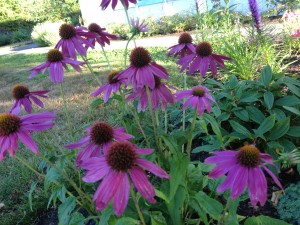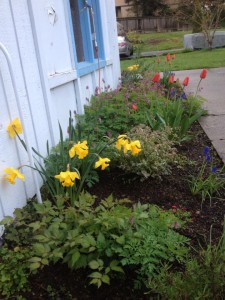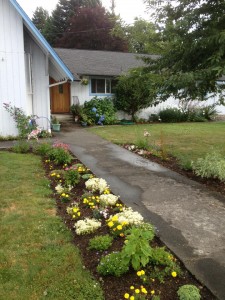I spent much of Saturday working in my garden. I should disclose that “my” garden includes large gardens in front of the church at which we live, as well as my personal gardens in front of the parsonage. I enjoy watching bulbs peek out of the ground throughout spring and summer, then burst into color at the right time. Over the years, as I humbly tend the dirt and pray to see beauty spring forth, I feel especially close to God.
God seems to have a special fondness for gardens; we hear about them throughout the Bible. After creating the world in seven days, Genesis tells us that God planted a garden in Eden. It had trees pleasing to the eye. Many examples throughout the Bible relate to gardens: plants in sunshine spreading shoots over the garden; fragrance spreading abroad; choice fruits; sowing seeds for garden. When promising redemption for a destroyed Zion, God promises to make her wastelands like the garden of the Lord. With his disciples, Jesus spent numerous hours in gardens. And he prayed strenuously in the Garden of Gethsemane before his death.
I find gardens interesting. More than that, a place of peace and beauty.
Perhaps you’re one of those garden spies, like me, that slowly cruises neighborhoods to peek at the gardens? Some well-established gardens are full of vibrant color, showcasing gentle roses, mums, lavender, marigolds, and variety of seasonal perennials and annuals. It’s obvious a caretaker has spent hours pruning carefully, fertilizing, pulling weeds and planting the delights “just so” to maximize curb appeal.
With other gardens, unfortunately often like mine, you’d never guess that hours have been poured into them. Flowers don’t bloom, mysterious plants appear that weren’t there last year. And of course, the flowers we did have now have no petals on them because the kids have eagerly plucked them because they were the only lovely things visible.
In the botanical world, the seeds, flowers and other items we plant are at our mercy for watering, feeding and general care. And it’s obvious some of us (especially me!) have some lessons yet to learn!
In the spiritual world, it is the Lord who plants and never forgets to take care of us. He provides spiritual water when we’re parched. He gave us the Son as the light for which we strain and reach as we grow. And He prunes sin in our lives – sometimes painfully at the time – to allow us to shoot forth bigger and stronger.
However, we are responsible for the “mystery” factors that don’t allow us to showcase the caretaker’s efforts. We slack off or quit reading the Bible. We neglect to pray. We decide to be in charge of our own lives, sure that who we are or become is from our own efforts.
Gardens don’t just happen, and growing spiritually doesn’t just happen. To grow spiritually, we each need to do our part. We do that by reading his word, hearing his word, allowing it to teach us and produce spiritual growth in us.
While I’m a gardener-in-training, there are a few things I do know about it. If you plant an apple tree, you’re not going to get plums. If you sow wheat, you’re not going to reap barley. The type of seed determines the fruit, and the same principle holds true in our spiritual lives.
Matthew 7:18 says that “A good tree cannot bear bad fruit, and a bad tree cannot bear good fruit.”
The fruit is the evidence that the tree actually is doing what it is supposed to do. Good intentions are not fruit. (Remember, you may have a heart of gold, but so does a hard-boiled egg.) Excellent excuses are not fruit. Blaming others is not fruit. Fruit is what you actually produce for God day by day. Fruit is the immeasurable influence for God that you have in the lives of others. Fruit is the impact that your faith, way of life and spirit of living has on others.
John 15:8 says “This is my Father’s glory, that you bear much fruit.”
As seeds are cultivated from plants to allow other plants and flowers to grow, we need to take the seeds that come from “the spiritual crop” and plant those in others so that spiritual gardens continue to grow.
It’s a botanical truth that some plants only will produce their fruit for a season, and then they wither and die. No more fruit; it’s over. Those plants are annuals. They were created for a specific, one-time burst of life. To see that burst of life again, we have to start the process all over again each spring. Then there are perennials. In the plant world, those are the plants that come back after a dormant, winter season. Often, they come back stronger, grow taller and produce even more and better-quality fruit.
God really isn’t in the annual business. He wants perennial Christians – the kind who weather the storm, stand the test, dig deeper into his word and produce lasting, ongoing results.
As Jesus said in John 15:16, “You did not choose me, but I chose you and appointed you to go and bear fruit – fruit that will last.” What kind of Christian are you? Are you one who is tossed around by every temptation or rough spot on the journey? Or do you allow the master’s pruning shears to shape you and refine you into something magnificent?
Jesus reminds us in John 15:5 that “no branch can bear fruit by itself; it must remain in the vine. Neither can you bear fruit unless you remain in me.”
Latch onto God’s abundant supply of grace, mercy and love, and in doing so, produce lasting fruit.



